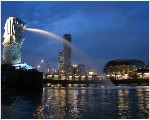We must uphold meritocracy and incorruptibility.
We provide opportunities for all, according to their ability and effort.
|
uphold meritocracy
|
|
|
national education
We must uphold meritocracy and incorruptibility. We provide opportunities for all, according to their ability and effort. |

|
|
About Meritocracy
Generally, Meritocracy is a system of a government or other organization wherein appointments are made and responsibilities assigned to individuals based upon demonstrated talent and ability merit. In a meritocracy, society rewards (via wealth, position, and social status) those who show talent and competence as demonstrated by past actions or by competition. Meritocracy in Singapore
Within a system of meritocracy, people have equal opportunities to learn, achieve and excel. While there is considerable mixing of the races in the public domain, the different communities maintain their own language, culture and customs. The analogy of four overlapping circles is useful in describing inter-racial relations in Singapore. In the overlapping area, Singaporeans share common experiences, a common language, that is, English, and have equal access to opportunities. Where the circles do not overlap, each community maintains its own language, culture, and customs. This emphasis on multiracialism and meritocracy has helped to build multiracial harmony out of diversity in Singapore, and fuelled economic development. |

|
|
benefits of upholding meritocracy
Singapore represents a practical, if imperfect, attempt at applying "fair" meritocracy to a multiracial society. Throughout its independence and dramatic economic growth, Singapore has maintained a strict adherence to the ideal of a procedurally equal meritocracy, while simultaneously promoting multiracialism as a fundamental national ideal. The struggle to maintain these occasionally conflicting ideals has yielded an interesting mix of policies that seek to sort individuals objectively while allowing racial groups to compensate for their perceived social and economic disadvantages. For Singapore, one of the most significant benefits would be that meritocracy fairness, which would then lead to harmony between races. Meritocracy brings out the best in everyone. This would ensure that everyone in the community strives hard and contribute to the society. People would not be judged by their races, instead they will be judged according to their merits and achievement. The idea of valuing merit connotes a high-minded dismissal of unfair biasing factors (i.e. race, sex and class). This would allow anyone, from any race, to have a chance to contribute to the society in a positive way. Hence, creating a more “well rounded” society. To this day, Singapore continues to hold up meritocracy as one of its official guiding principles for domestic public policy formulation. disadvantage/misunderstanding
There is criticism backed by evidence that this system has some serious disadvantages: for one, Singaporean society is being increasingly stratified; and, for another, an elite class is being created from just a narrow segment of the population. Commentators have also criticized the city-state for not applying the meritocracy principle uniformly. They cite, for example, the disproportionate influence and presence of the family of the founding prime minister Lee Kuan Yew in both political and business circles. Although most Singaporeans still agree that the city-state's tremendous economic success has been due in part to its strong emphasis on developing and promoting talented leaders,[15] there are more and more signs that an increasing number of Singaporeans believe Singapore is instead becoming an elitist society. Defendants claim the ancient Chinese proverb that 'Wealth does not pass three generations', suggesting that elitists will eventually be, and often are, replaced by those lower down the hierarchy. Indeed, many top political leaders in Singapore (and also China) come from peasant backgrounds, while modern peasants boast about their great ancestry, though the current Prime Minister is the son of a former Prime Minister. |
|
|
conclusion
In conclusion, meritocracy plays an important role in maintaining peace in Singapore. How it this so? Meritocracy is based on values such as equality, progress and fairness. Meritocracy rewards citizens based on their talents and efforts. This is essential in Singapore as we are a multi-racial country. With different races living together in one state, the chances of racial conflicts are highly possible. Hence, implementing meritocracy will reduce the chances of it. Without meritocracy, citizens of different races may feel threatened and unharmonious, knowing their race may play a part in deciding their success. This is shown in the case-study given regarding Singapore's merger with Malaysia. The Malays felt threatened by the Chinese to seize political power over the country. This led to racial riots, causing death and damages to the country. This concludes that a meritocracy system is beneficial to a country, especially those with different races. No races will be discriminated against and everyone has an equal chance in succeeding, depending on their competence in the society. So let's uphold meritocracy and incorruptibility towards a harmonious Singapore! |